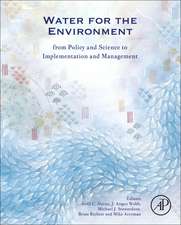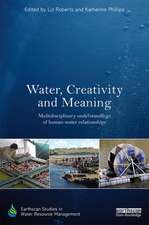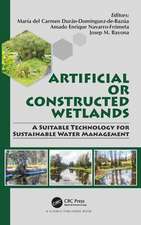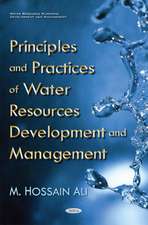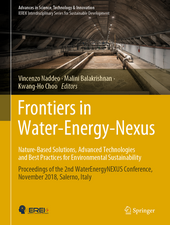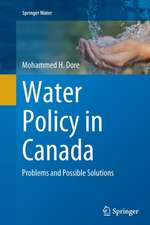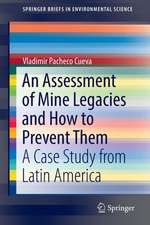Water Resources of Jordan: Political, Social and Economic Implications of Scarce Water Resources: World Water Resources, cartea 1
Autor Elias Salameh, Musa Shteiwi, Marwan Al Raggaden Limba Engleză Paperback – 21 dec 2018
| Toate formatele și edițiile | Preț | Express |
|---|---|---|
| Paperback (1) | 349.25 lei 38-44 zile | |
| Springer International Publishing – 21 dec 2018 | 349.25 lei 38-44 zile | |
| Hardback (1) | 391.61 lei 3-5 săpt. | |
| Springer International Publishing – 6 iun 2018 | 391.61 lei 3-5 săpt. |
Preț: 349.25 lei
Nou
Puncte Express: 524
Preț estimativ în valută:
66.84€ • 69.52$ • 55.18£
66.84€ • 69.52$ • 55.18£
Carte tipărită la comandă
Livrare economică 10-16 aprilie
Preluare comenzi: 021 569.72.76
Specificații
ISBN-13: 9783030085285
ISBN-10: 3030085287
Pagini: 154
Ilustrații: XVI, 154 p. 51 illus., 42 illus. in color.
Dimensiuni: 155 x 235 mm
Greutate: 0.27 kg
Ediția:Softcover reprint of the original 1st ed. 2018
Editura: Springer International Publishing
Colecția Springer
Seria World Water Resources
Locul publicării:Cham, Switzerland
ISBN-10: 3030085287
Pagini: 154
Ilustrații: XVI, 154 p. 51 illus., 42 illus. in color.
Dimensiuni: 155 x 235 mm
Greutate: 0.27 kg
Ediția:Softcover reprint of the original 1st ed. 2018
Editura: Springer International Publishing
Colecția Springer
Seria World Water Resources
Locul publicării:Cham, Switzerland
Cuprins
1. Introduction.- 2. Water Resources.- 3. Patterns of Water Use.- 4. Water Pollution.- 5. Waste Water treatment.- 6. Water Pollution Management and Cost.- 7. Water Politics.- 8 Conclusions and Recommendations.
Notă biografică
Prof. Dr. Elias Salameh is a professor of hydrogeology and hydrochemistry at the University of Jordan. He obtained his Doctor of Science degree and his MSc in Applied Geology from the Technical University of Munich, Germany. He received his second MSc in Geophysics from the Ludwig Maximillian University of Munich, Germany. He has been a professor at the University of Jordan since 1985. He has published more than 230 research articles in international journals and has supervised some 50 PhD and 120 MSc theses. He has initiated, led, and carried out a large number of international research programs in water and related fields. In 2006, he and his colleagues discovered the first large meteoritic impact site in the Middle East and North Africa, in Jordan/Waqf as Suwwan area. He headed the Department of Applied Geology and Environment of the University of Jordan several times, each for a number of years. At the university, he also founded the Water Research and Study Center and served as its director from 1983 to 1992. In 2004 and 2005, he served as the Chairman of the Founding Committee of the German-Jordanian University. In addition, he has been serving as a member of the Royal Committee on Water since its formation in 2007 and was a member of the Board of Trustees of Balqa Applied University from 2008 to 2015. Professor Salameh was decorated with the First Class Order of Merits from the President of the Federal Republic of Germany in 2006 as well as many other local and international orders of merit.
Prof. Dr. Musa Shteiwi is a professor of sociology at the University of Jordan and the Director of the Center for Strategic Studies at the University of Jordan since 2011. He obtained his PhD. in sociology from the University of Cincinnati, Ohio, United States in 1991 His experience includes advisory and consultancies with government, UN, and international organizations and research institutions. He worked as a Regional Advisor on Social Policies and Social Issues for UNESCWA (200-2007). He has played a key role as a team leader on many National and regional projects the last of which was Jordan Scenarios: 2030. He received the state encouragement award for his research in 2001. He has more than 40 articles and published books in the field of development, social policies, poverty, unemployment, women, social classes, civil society and political parties, and refugees.
Prof. Shteiwi is a board member in many Academic and policy institutions: Member in the National Consultative Council for the Department of Statistics (Since 2012), Head of the Social Policies Committee, (The Economic and Social Council of Jordan 2010-2014), and a Member of the Board of Trustees of The Hashemite University (2010-2014). Moreover, he was an Executive Board Member in Jordan Radio and Television Association (2006-2008).
Dr. Marwan Al Raggad is associate researcher at the Water,Energy and Environment Center at the University of Jordan. He holds a PhD in groundwater management and Post Doc in groundwater modelling and has solid experience in water management gained from his work as a hydrogeologist at the Ministry of Water and Irrigation in 2002-2010. Since joining the University of Jordan in 2010, Dr. Al-Raggad has led many international research projects in the domain of climatic change effects on water resources, managed aquifer recharge, groundwater quality, and treated waste water reuse in ground water recharge.
Textul de pe ultima copertă
This book gives a detailed account of the scarce water resources of Jordan, with a focus on their quantities, quality, and use for different sectors. It details the political, social, and economic dimensions of the scarce water resources along with their implications on Jordan's cooperation with its neighbors. The book includes implemented projects of dams, canals, water supply networks, waste water treatment, and more. It gives an overview of which projects have been successful and which have failed to achieve their purposes and why. Shared water with other countries and their developmental implications to the water sector are discussed and future water supply projects, such as the Red Sea-Dead Sea conduit project, are elaborated on. The book also touches upon the waves of refugees and their impact on the water sector and water strategies in Jordan.
Caracteristici
Provides a detailed account of scarce water management in Jordan Discusses the importance of regional and international cooperation in water management Offers an overview of crises management of water resources regarding the waves of refugees Gives an account of living with water scarcity










